

You can’t unsee Tedlexa, the Internet of Things/AI bear of your nightmares. Can We Make Our Robots Less Biased Than We Are? Do These A.I.-Created Fake People Look Real to You? Can an Algorithm Prevent Suicide? The algorithm is built on an analysis of thousands of previous suicides in the V.A.’s database, dating to 2008.
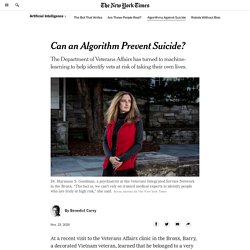
The computer mixes and shuffles scores of facts from the medical records — age, marital status, diagnoses, prescriptions — and settles on the factors that together are most strongly associated with suicide risk. The V.A. model integrates 61 factors in all, including some that are not obvious, like arthritis and statin use, and produces a composite score for each person. Those who score at the very top of the range — the top 0.1 percentage — are flagged as high risk. How Archaeologists Are Using Deep Learning to Dig Deeper. Finding the tomb of an ancient king full of golden artifacts, weapons and elaborate clothing seems like any archaeologist’s fantasy.
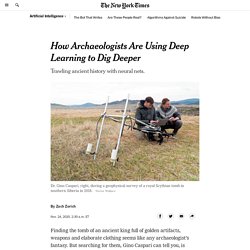
But searching for them, Gino Caspari can tell you, is incredibly tedious. Dr. Coronavirus Antibodies Good. Machine-Made Molecules Better? The coronavirus might be new, but nature long ago gave humans the tools to recognize it, at least on a microscopic scale: antibodies, Y-shaped immune proteins that can latch onto pathogens and block them from infiltrating cells.
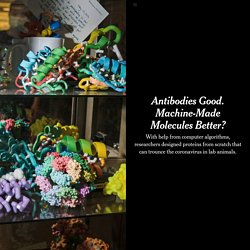
Millions of years of evolution have honed these proteins into the disease-fighting weapons they are today. But in a span of just months, a combination of human and machine intelligence may have beaten Mother Nature at her own game. Using computational tools, a team of researchers at the University of Washington designed and built from scratch a molecule that, when pitted against the coronavirus in the lab, can attack and sequester it at least as well as an antibody does. Untitled. Machine learning is a fantastic tool for renovating old photos and videos.
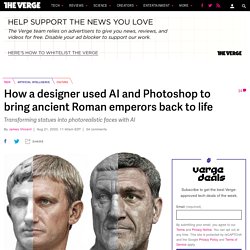
So much so that it can even bring ancient statues to life, transforming the chipped stone busts of long-dead Roman emperors into photorealistic faces you could imagine walking past on the street. The portraits are the creation of designer Daniel Voshart, who describes the series as a quarantine project that got a bit out of hand. Primarily a VR specialist in the film industry, Voshart’s work projects got put on hold because of COVID-19, and so he started exploring a hobby of his: colorizing old statues. Looking for suitable material to transform, he began working his way through Roman emperors. He finished his initial depictions of the first 54 emperors in July, but this week, he released updated portraits and new posters for sale. Untitled. In the same way, the paper’s authors argue, this colonial history explains some of the most troubling characteristics and impacts of AI.
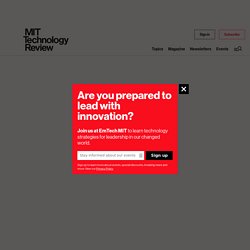
They identify five manifestations of coloniality in the field: Algorithmic discrimination and oppression. The rise of robots: forget evil AI – the real risk is far more insidious. When we look at the rise of artificial intelligence, it’s easy to get carried away with dystopian visions of sentient machines that rebel against their human creators.
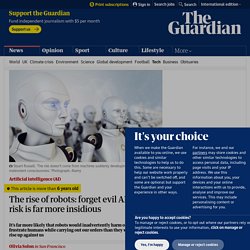
Fictional baddies such as the Terminator’s Skynet or Hal from 2001: A Space Odyssey have a lot to answer for. However, the real risk posed by AI – at least in the near term – is much more insidious. It’s far more likely that robots would inadvertently harm or frustrate humans while carrying out our orders than they would become conscious and rise up against us. In recognition of this, the University of California, Berkeley has this week launched a center to focus on building people-pleasing AIs.
Facebook has trained an AI to navigate without needing a map. The algorithm lets robots find the shortest route in unfamiliar environments, opening the door to robots that can work inside homes and offices.
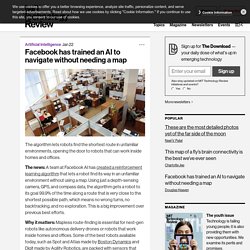
The news: A team at Facebook AI has created a reinforcement learning algorithm that lets a robot find its way in an unfamiliar environment without using a map. Using just a depth-sensing camera, GPS, and compass data, the algorithm gets a robot to its goal 99.9% of the time along a route that is very close to the shortest possible path, which means no wrong turns, no backtracking, and no exploration. This is a big improvement over previous best efforts. This map of a fly’s brain connectivity is the best we’ve ever seen. The news: Researchers from Google and Janelia Research Campus in Virginia have unveiled the biggest high-resolution map of brain connectivity yet, known as a connectome.
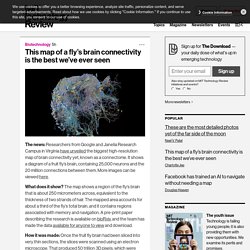
It shows a diagram of a fruit fly’s brain, containing 25,000 neurons and the 20 million connections between them. More images can be viewed here. Amazon Echo speaker goes 'rogue,' tells scared mom to 'stab yourself' - AOL News. The Artificial Intelligence Revolution: Part 1. PDF: We made a fancy PDF of this post for printing and offline viewing.
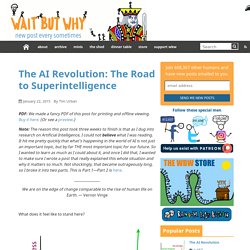
Buy it here. (Or see a preview.) ‘Robots’ Are Not 'Coming for Your Job'—Management Is. Elon Musk says Neuralink machine that connects human brain to computers 'coming soon' Elon Musk has revealed his Neuralink startup is close to announcing the first brain-machine interface to connect humans and computers.
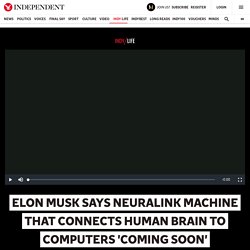
The entrepreneur took to Twitter to tell followers the technology would be “coming soon” – though he failed to provide details. Neuralink was set up in 2016 with the ambitious goal of developing hardware to enhance the human brain, however, little about how this will work has been made public. We’ll tell you what’s true. You can form your own view. Facial recognition has to be regulated to protect the public, says AI report. Artificial intelligence has made major strides in the past few years, but those rapid advances are now raising some big ethical conundrums.
Chief among them is the way machine learning can identify people’s faces in photos and video footage with great accuracy. This might let you unlock your phone with a smile, but it also means that governments and big corporations have been given a powerful new surveillance tool. A new report from the AI Now Institute (large PDF), an influential research institute based in New York, has just identified facial recognition as a key challenge for society and policymakers.
China Recruits “Patriotic” Children to Develop Its AI Weapons – Futurism. In the Age of A.I., Is Seeing Still Believing? In 2011, Hany Farid, a photo-forensics expert, received an e-mail from a bereaved father. Three years earlier, the man’s son had found himself on the side of the road with a car that wouldn’t start. When some strangers offered him a lift, he accepted. A few minutes later, for unknown reasons, they shot him. A surveillance camera had captured him as he walked toward their car, but the video was of such low quality that key details, such as faces, were impossible to make out. Multi Purpose AI Robot Justin. Joseph Stiglitz on artificial intelligence: 'We’re going towards a more divided society' 10 Predictions About The Future That Should Scare The Hell Out Of You. The future is ear: Why “hearables” are finally tech’s next big thing click 2x.
China Achieves World Leadership in AI. How Artificial Intelligence Could Increase the Risk of Nuclear War. Max Tegmark: How to get empowered, not overpowered, by AI. The Elements of AI - a free online course. AI 101, Because We Can't Escape the Inevitable (It's Free Too) Stop Using Discriminatory AI, Human Rights Groups Say. When it comes to developing artificial intelligence, President Trump may want a free-market approach. But a number of experts disagree — we need guidelines to protect people from discriminatory algorithms.
Today, a group of humans rights organizations such as Human Rights Watch, Amnesty International, The Wikimedia Foundation, Access Now, and others called on governments and technology companies to adopt guiding principles to protect human rights. Predictive Policing Worse than 'Minority Report' click 2x. LAPD's Terrifying Policing Algorithm Is Basically 'Minority Report' click 2x. The Los Angeles Police Department was recently forced to release documents about their predictive policing and surveillance algorithms, thanks to a lawsuit from the Stop LAPD Spying Coalition (which turned the documents over to In Justice Today).
Boston Dynamics' Atlas Just Went For Jog In The Garden click 2x. DeepMind's new AI ethics unit is the company's next big move. Lawmakers Want You to Be Able to Sue Robots. How Philip K. Dick redefined what it means to be (in)human. Fifty years ago, Philip K. Fake news 2.0: personalized, optimized, and even harder to stop. Fake news may have already influenced politics in the US, but it’s going to get a lot worse, warns an AI consultant to the CIA. Sean Gourley, founder and CEO of Primer, a company that uses software to mine data sources and automatically generate reports for the CIA and other clients, told a conference in San Francisco that the next generation of fake news would be far more sophisticated thanks to AI. Future of robotics vision is a praying mantis (wearing tiny red glasses) Separating Science Fact From Science Hype: How Far off Is the Singularity? The term “artificial intelligence” was only just coined about 60 years ago, but today, we have no shortage of experts pondering the future of AI.
Chief amongst the topics considered is the technological singularity, a moment when machines reach a level of intelligence that exceeds that of humans. Preparing for Artificial Intelligence – Becoming Human: Artificial Intelligence Magazine. Saudi Arabia Made a Robot a Citizen. Now, She's Calling For Women's Rights. Your Brain Hallucinates Your Conscious Reality. Vox - Robots are already assisting humans in many job... Google’s Artificial-Intelligence Wizard Unveils a New Twist on Neural Networks. Knowledge & Learning.
China’s AI Awakening中国 人工智能 的崛起 - MIT Technology Review. Issues. Inside the Moonshot Effort to Finally Figure Out the Brain - MIT Technology Review. Types of AI: From Reactive to Self-Aware [INFOGRAPHIC] ‘I’ve seen things you people wouldn’t believe’: what Blade Runner 2049’s dystopia tells us about 2017. Forget Killer Robots—Bias Is the Real AI Danger - MIT Technology Review. When artificial intelligence met peaches. Ray Kurzweil: Singularity Will Arrive by 2045. Why Superintelligent AI Could Be the Last Human Invention. Following Elon Musk Letter, UK Government Plans to Ban Fully Autonomous Weapons.
The Human Brain: Ultimate Supercomputer – Health Transformer. We Just Created an Artificial Synapse That Can Learn Autonomously. What Makes You You? - Wait But Why. Is Consciousness AI to Our Genes? - Philosopher.io. IBM, US Air Force Are Building a Neuromorphic Supercomputer. Cheat Sheets for AI, Neural Networks, Machine Learning, Deep Learning & Big Data. Chirons Will Lead Us Out of the AI Technopanic (and You Can Be a Chiron) Share This Infographic: 10 Truths about Deep Learning. Introducing Open Mined: Decentralised AI – Becoming Human. Mark Zuckerberg and Elon Musk are both wrong on the dangers of A.I. DARPA Is Planning to Hack the Human Brain to Let Us "Upload" Skills.
Elon Musk's Neuralink Venture Seen As Targeting Human-Computer Link. Google’s Leading Futurist Predicts Humans Will Start Living Forever by 2029. Why Cryonics Makes Sense - Wait But Why. Predictions for life after the Singularity. Scientists Have Made a Huge Breakthrough In Cryogenics click 2x. Neuralink and the Brain's Magical Future. Freezing Lazarus: The Cryonics of Eternal Life. Heartbeat Music: Parents Remember Their Son Through His Song Of Life. Alan Watts on Death, Animated Short Film. Death. Perspectives on Death: CC Philosophy #17. Batman & Identity: Crash Course Phil. #18. Personal Identity: Crash Course Phil. #19. Arguments Against Personal Identity: Crash Course Philosophy #20.
What Is Personhood Theory? Personhood: Crash Course Philosophy #21. Idea of the Person - The Anthropology Of The Person Since Mauss - Personhood, Witchcraft, Culture, and Press. Where Does Your Mind Reside?: CC Philos. #22. The Definition of Death (Stanford Encyclopedia of Philosophy) The Mystery of Personal Identity: What Makes You and Your Childhood Self the Same Person Despite a Lifetime of Change.